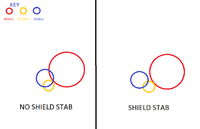Shield stab: Difference between revisions
No edit summary |
|||
| Line 23: | Line 23: | ||
*Meta Knight: Mach Tornado, down tilt, [[Drill Rush]], [[forward tilt]] | *Meta Knight: Mach Tornado, down tilt, [[Drill Rush]], [[forward tilt]] | ||
*Wario: [[Down air]] | *Wario: [[Down air]] | ||
==Shield angling== | |||
If a player sees an incoming shield stab attempt, they may be able to shift the position of their shield to cover up the exposed area by slightly tilting the control stick, a technique referred to as '''shield angling'''. Tilting too far, too quickly will trigger a roll or sidestep, although in ''[[Super Smash Bros. Ultimate|Ultimate]]'', holding multiple shield buttons or a [[grab]] button alleviates this. This technique becomes harder to pull off successfully as a shield weakens and shrinks, and since dodging or sidestepping is usually more reliable if the defending fighter already sees an attack incoming and is low on shield, it doesn't see an exceptional amount of use. | |||
[[Category:Techniques (SSB)]] | [[Category:Techniques (SSB)]] | ||
[[Category:Techniques (SSBM)]] | [[Category:Techniques (SSBM)]] | ||
[[Category:Techniques (SSBB)]] | [[Category:Techniques (SSBB)]] | ||
[[Category:Techniques (SSBU)]] | |||
Revision as of 03:02, December 30, 2018
- "Poke" redirects here. For the smasher, see Smasher:Poke.
A shield stab, also called a shield poke, is the event of finding a damageable portion of a character slightly outside of their shield and striking it, therefore bypassing their attempt to shield. This is an extremely useful technique, as it can be used to strike an otherwise defended enemy.
Some characters are easier to shield stab than others. For example, Mr. Game & Watch's shield is small compared to his body size (in Melee), and Captain Falcon and Pit are too tall for a spherical bubble to cover properly. A character that is short and/or round (such as Kirby or Olimar) can be hard to shield stab for similar reasons.
Some moves are more suited for shield stabbing than others. Multi-hit moves (such as Mach Tornado) that are used at their maximum range can deplete a shield with the first few hits and then strike on the next few. The hitbox shape of a move also affects its shield stabbing viability; Marth's down tilt only hits very low to the ground, so it can hit an opponent's uncovered feet without accidentally touching their shield's center. Connecting a move with significant shield damage will render the user's next move likely to shield stab, though the target may just choose to drop their shield if it gets that low.
While shield stabbing can be useful, in some cases it can actually be a problem if the attacker is trying to get a shield break; in fact breaking a shield and leaving the target open for a fully-charged smash or super-powered special move might be preferred over hitting a shielding opponent with a basic attack. Since shields can get rather small before they break, this means attackers trying to get a break need very good aim if they want to hit the shield as opposed to the target.
Due to Yoshi's unique egg shield, which does not shrink and always covers his entire body, he cannot normally be shield stabbed. However, in Brawl, the very bottoms of Yoshi's feet hang out the bottom of his egg, which can be shield stabbed from below with very precise distancing.
Shield stab execution
A shield stab will only occur if a character's hitbox connects only with the exposed hurt box. If the hitbox of the attack touches the shield even a little bit, the attack will be shielded, even if it looks like it connects with the exposed part of the character.
Examples of well-known shield stabbing moves
- Kirby: Up tilt (Smash 64)
- Marth: Down tilt
- Peach: Down smash (Melee more than Brawl)
- Mr. Game & Watch: Back air (Brawl more than Melee), neutral aerial (Brawl)
- Meta Knight: Mach Tornado, down tilt, Drill Rush, forward tilt
- Wario: Down air
Shield angling
If a player sees an incoming shield stab attempt, they may be able to shift the position of their shield to cover up the exposed area by slightly tilting the control stick, a technique referred to as shield angling. Tilting too far, too quickly will trigger a roll or sidestep, although in Ultimate, holding multiple shield buttons or a grab button alleviates this. This technique becomes harder to pull off successfully as a shield weakens and shrinks, and since dodging or sidestepping is usually more reliable if the defending fighter already sees an attack incoming and is low on shield, it doesn't see an exceptional amount of use.

